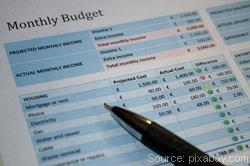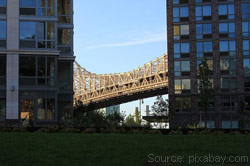For most people, there comes a time when the decision to move out has finally been made and you've decided on renting your first apartment. Whether you're moving out on your own or renting an apartment with a roommate or two, you're going to need to have some money saved up to cover the expenses that are associated with renting an apartment. Perhaps you've been planning on moving out for quite some time and already have a good amount of dough saved up, ready for your initial rent and security deposit payments. Or maybe you've just started mulling over the possibility and want to know how much money you need to save.

Either way, there are some costs associated with renting an apartment that are the same no matter where you choose to live. You should be prepared for these costs beforehand, and the best way to go about this is by making a budget for yourself at the beginning of your apartment hunting, so that way you'll know exactly how much money you have to spend on the apartment and the monthly rent and you'll know what your price range is when you go looking for a place.
Making a budget will also help you figure out the amount of money you'll need to set aside every month for rent and other apartment-related expenses and how much you'll have left over to save, spend or do whatever else you want with it. While apartment-related expenses will vary greatly depending on where you live and what kind of apartment you get, there are certain expenses that are the same everywhere and that you can expect to pay each month when you move into an apartment.
Making a budget
When you're starting out, making a budget will really help to clarify things and to sort out your financial situation so you know exactly where you stand. The first thing to do is to figure out what your income is each month. In other words, how much money do you make each month? Let's say, for the sake of this hypothetical situation that you make $3,000 each month after taxes. That will be the base number that you will build your budget around.
From there, you can begin searching for apartments that fit your budget and your price range. Depending on where you live or where you're moving to, monthly rent can vary greatly. For example, if you're moving to a big city, you can expect to pay at least $1,500-$2,000 a month in rent. However, other areas of the country can be much cheaper, ranging anywhere from $750-1,000 a month, depending on the size of the apartment. Since rent can differ so drastically from one place to the next, it's best to come up with a comfortable range that you can reasonably afford and work from there. Once you've come up with a rent total that will fit your budget, you'll have to factor in other living-related expenses that you will have to pay each month, and work those numbers into your budget in order to come up with the total cost of living expenses for your apartment each month and total amount of money left over to save or spend. But what are some of these other living expenses you can expect to pay?
Apartment expenses
Here are some of the most common expenses that you will be faced with upon renting an apartment, both one-time expenses and monthly expenses:
- Security deposit - You will pay your security deposit upon renting your apartment, and it usually it will be equal to one month's rent. The security deposit will be a way of ensuring that you take care of the property that you're renting and that you abide by all rules and regulations set by the apartment building superintendent or landlord. If there is any damage done to the apartment while you are living there, you may be denied your security deposit upon moving out. Otherwise, if you keep the place in good shape, it's yours at the end of your lease.
 First and last month's rent - Another thing that a lot of first-time renters overlook is the fact that you will often need to front your first and last month's rent when you first move into a new apartment. This can be as much as $3,000, depending on how much you are paying per month for the apartment, and is a big expense to consider when renting an apartment, so it helps to make a budget and save up to make sure you have enough money to cover this and your security deposit.
First and last month's rent - Another thing that a lot of first-time renters overlook is the fact that you will often need to front your first and last month's rent when you first move into a new apartment. This can be as much as $3,000, depending on how much you are paying per month for the apartment, and is a big expense to consider when renting an apartment, so it helps to make a budget and save up to make sure you have enough money to cover this and your security deposit.
- Utilities - Your utilities expenses will vary depending on what kind of apartment you're renting and whether or not your utilities will be included in your monthly rent. If not, you will have to set aside a certain amount of money each month for gas and electricity, which can run you another $200 per month. Also, one utility that is not included in your rent will be your phone/cable/internet bill, which can also cost up to $100 a month, depending on what kinds of services you get.
- Parking - If you live in an apartment complex that charges monthly fees for parking passes, you'll have to factor this expense in to your monthly budget as well. Also consider the parking costs that will be incurred if you live in a major city that charges for long-term parking, or if you'll have to pay for a resident parking permit to be able to park the car on the street in front of your building.